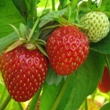
June is National Fresh Fruit and Vegetable Month. Natural Standard celebrates by highlighting various fruits and vegetables.
Blueberry: Blueberries have high antioxidant levels due to the presence of anthocyanins, which are the pigments many plants produce to attract the birds and insects necessary for pollination. Lowbush (wild) blueberries have higher levels of certain antioxidant compounds than highbush varieties.
Avocado: Avocados are fruits, not vegetables, belonging to the genus Persea and the Lauraceae family. An avocado has a higher fat content (5 grams per serving) than other fruit, but the fat is monounsaturated fat, which is considered healthy when consumed in moderation.
Strawberry: Strawberry (Fragaria spp.) is predominantly known for its bright red, edible fruit covered in small seeds. The fruit is fragrant, and high in fiber, vitamin C, folate, potassium and antioxidants.
Cherry: Cherries have been used as both food and medicine. Cherries contain polyphenols, which may have antioxidant, anticancer, and anti-inflammatory properties. However, there is limited scientific evidence to support these uses.
Spinach: Spinach (Spinacia oleracea) is a good source of iron, folic acid, vitamin B6, nitrates, oxalates, beta-carotene, and lutein.
For information on more fruits and vegetables, please visit Natural Standad's Foods, Herbs and Spplements Database.
The information in this brief report is intended for informational purposes only, and is meant to help users better understand health concerns. This information should not be interpreted as specific medical advice. Users should consult with a qualified healthcare provider for specific questions regarding therapies, diagnosis and/or health conditions, prior to making therapeutic decisions. Copyright © 2024 NatMed. Commercial distribution or reproduction prohibited. NatMed is the leading provider of high-quality, evidence-based, clinically-relevant information on natural medicine, dietary supplements, herbs, vitamins, minerals, functional foods, diets, complementary practices, CAM modalities, exercises and medical conditions. Monograph sections include interactions with herbs, drugs, foods and labs, contraindications, depletions, dosing, toxicology, adverse effects, pregnancy and lactation data, synonyms, safety and effectiveness.
